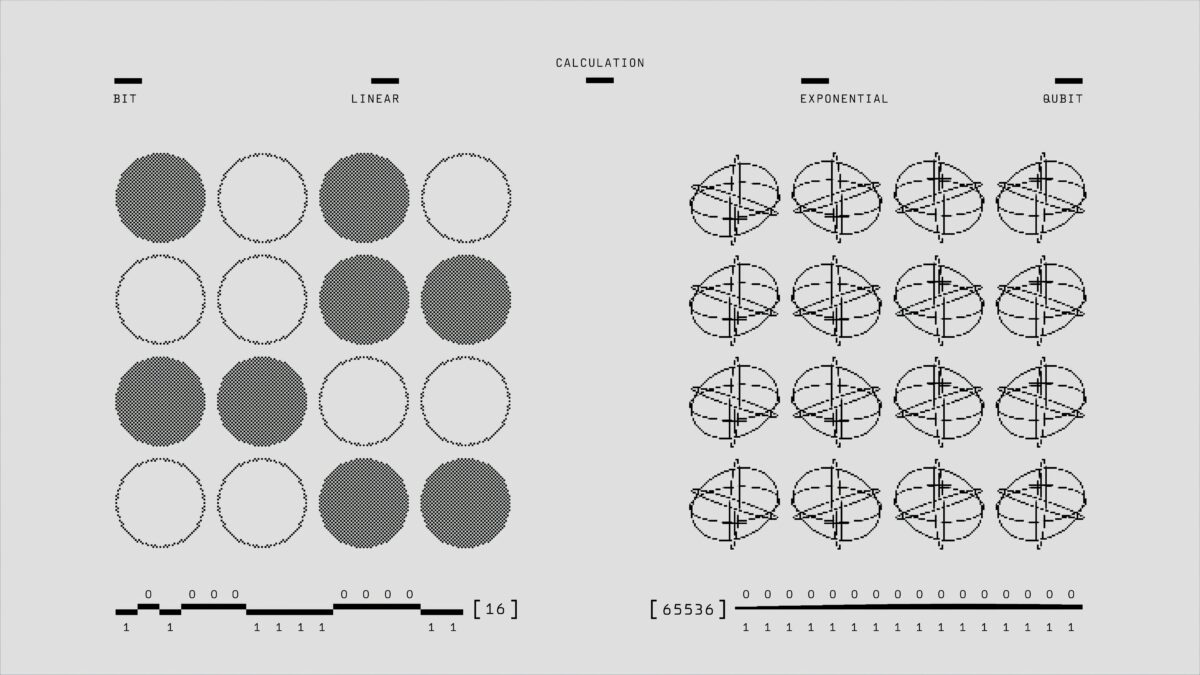Quantum technology is no longer confined to the pages of science fiction; it’s rapidly becoming an everyday part of modern innovation. By harnessing the principles of quantum mechanics, this technology promises to revolutionize industries ranging from computing to healthcare. However, as with any groundbreaking advancement, quantum technology is shrouded in both excitement and misconceptions. This article aims to demystify quantum technology by providing a straightforward explanation, debunking prevalent myths and exploring practical applications. It also highlights leading quantum companies and stocks and discusses existing products and projects, so as to offer a comprehensive overview of what quantum technology really is about.
Quantum Technology in Simple Terms
At its core, quantum technology leverages the behaviours of particles at the quantum level (very, very, very small). Think atoms and subatomic particles. Unlike classical bits in traditional computing, which are either a 0 or a 1, quantum bits (qubits) can exist in multiple states simultaneously, thanks to a property called superposition. Imagine spinning a coin; while in motion, it’s both heads and tails until it lands. This allows quantum computers to process a vast number of possibilities at once.
Another key principle is entanglement, where particles become interconnected such that the state of one instantly influences the state of another, regardless of the distance separating them. Einstein famously referred to this as “spooky action at a distance.” This phenomenon enables instantaneous communication between entangled particles, a feature that could revolutionize data transmission and encryption.
In essence, quantum technology utilises these principles to perform complex computations more efficiently than classical computers, solve problems previously deemed unsolvable, and create secure communication channels.

Practical Applications of Quantum Technology
Quantum technology is already being applied in computing fields where classical computing struggles. In healthcare, quantum simulations help model molecular interactions, accelerating drug discovery and personalised medicine. Finance institutions use quantum algorithms for portfolio optimisation and fraud detection, improving decision-making in complex markets. Cybersecurity is also evolving with Quantum Key Distribution (QKD), enabling ultra-secure communications resistant to hacking. In logistics, quantum computing enhances route optimisation for global supply chains, while AI benefits from faster data processing and improved machine learning models.
Beyond these, materials science is leveraging quantum simulations to design more efficient batteries and superconductors, promising advancements in energy storage and sustainable technology. Governments and companies are also investing in quantum sensors, which can revolutionize navigation, medical imaging, and environmental monitoring by detecting minute changes in gravitational fields or magnetic properties. While many of these applications are still developing, the transition from theory to practice is already underway.
Leading Quantum Companies
Quantum technology is advancing rapidly, with companies across the globe pushing the boundaries of computing, cryptography, and communication. While the industry is still in its early stages, several key players are emerging as leaders.
IBM Quantum (USA): IBM has been a pioneer in quantum computing, offering cloud-based access to quantum processors and developing cutting-edge quantum hardware and software. Their IBM Quantum Network connects researchers and businesses to real quantum systems.
Google Quantum AI (USA): Google made headlines with its claim of achieving quantum supremacy in 2019. Its Sycamore processor is one of the most advanced, and Google continues to invest in fault-tolerant quantum computing.
IonQ (USA): One of the first pure-play quantum computing companies to go public, IonQ specializes in trapped-ion technology, a promising approach to building scalable quantum computers.
D-Wave Systems (Canada): D-Wave focuses on quantum annealing, an approach well-suited for optimization problems in logistics, AI, and finance. While different from universal quantum computing, its technology is already being used commercially.
- SpinQ (China): SpinQ builds affordable, compact NMR and superconducting quantum computers, aiming for education and broader commercial accessibility.
- IQM Quantum Computers (Finland): IQM distinguishes itself by delivering on-premises quantum computers and cloud access, with a focus on integrating quantum systems into HPC centers, and having it’s own quantum chip manufacturing.
Alice & Bob (France): A leading European quantum startup, Alice & Bob is revolutionising quantum computing with its focus on error-correcting “cat qubits,” a promising step toward building fault-tolerant quantum computers. The company is at the forefront of European quantum innovation.
For investors, quantum stocks remain high-risk, high-reward ventures. While some companies, like IBM and Google, are backed by tech giants, others are pioneering new approaches with potential long-term payoffs. As the industry matures, global collaboration and competition will shape the future of quantum technology.
Example Quantum Products on the Market
Quantum technology is no longer confined to research labs: several products and initiatives are already making an impact. Quantum computers, though not yet widely accessible, are available through cloud platforms like IBM Quantum and Google Quantum AI, allowing businesses and researchers to experiment with real quantum processors. Quantum cryptography is another commercialised field, with companies like ID Quantique and Toshiba offering Quantum Key Distribution (QKD) systems for governments and financial institutions to secure communications. China has already deployed a quantum-secured satellite network, demonstrating the real-world application of quantum encryption for secure global communications.
In precision sensing, quantum-based atomic clocks developed by companies like ColdQuanta and Muquans provide ultra-accurate timekeeping, essential for navigation systems and financial transactions. Quantum sensors are also being integrated into medical imaging, enhancing diagnostics by detecting tiny variations in electromagnetic fields. In the energy sector, Volkswagen and Daimler are using quantum simulations to improve battery chemistry, aiming to create more efficient electric vehicle batteries. Meanwhile, quantum-inspired algorithms are already optimising supply chains for companies like Airbus and DHL, showing that even before full-scale quantum computers arrive, businesses can benefit from quantum innovations today.
Debunking 3 Common Myths about Quantum Technology
One of the biggest myths about quantum technology is that quantum computers will replace classical computers. While quantum computing is powerful, it excels in specific tasks like optimization, cryptography, and molecular simulation—problems that classical computers struggle with. However, for everyday tasks like browsing the internet, running spreadsheets, or gaming, classical computers remain the best option. Quantum and classical computing will likely work together, with quantum processors handling specialized problems while traditional systems manage routine operations.
Another misconception is that quantum computers are already faster than supercomputers in all tasks. While Google’s 2019 claim of achieving “quantum supremacy” made headlines, this term refers to solving one highly specific problem faster than a classical machine—not general performance superiority. Today’s quantum computers still face major challenges, including error rates and qubit stability. They require highly controlled environments and are not yet ready for mass adoption. Significant improvements in hardware and error correction are needed before they can consistently outperform classical supercomputers.
A third myth is that quantum cryptography makes all current encryption obsolete overnight. While quantum computers could eventually break widely used encryption methods like RSA, this is not an immediate threat. Researchers are already developing post-quantum cryptography—new encryption algorithms resistant to quantum attacks. Governments and cybersecurity firms are working on a transition plan, ensuring data remains secure. In the meantime, Quantum Key Distribution (QKD) offers a new layer of security, using the principles of quantum mechanics to create encryption that is theoretically unbreakable.

Conclusion
Quantum technology is advancing rapidly, moving from theoretical research to real-world applications. While it is not yet a mainstream solution, industries like healthcare, finance, cybersecurity, and materials science are already benefiting from quantum innovations. Companies across the globe are driving progress, and quantum-secured communications, cloud-based quantum computing, and precision sensing are already on the market.
Despite the excitement, quantum technology is not a magic solution that will replace classical computing or revolutionise everything overnight. Challenges like qubit stability, error correction, and scalability remain, but steady advancements continue to push the boundaries. As quantum systems improve, they will complement existing technologies rather than replace them, reshaping industries step by step. Whether in computing, security, or AI, the quantum era is unfolding, and its impact will become more and more tangible in the years ahead.

